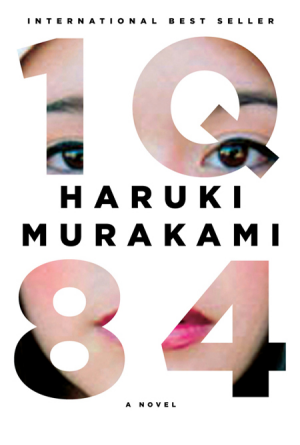By Dessa Bayrock (The Cascade) – Email
Print Edition: October 17, 2012
 This is a massive and partially-satisfying novel. With his growing popularity, Murakami has become (like JK Rowling) a little insufferable in the length and absurdity of his novels, but I still can’t help it – I love the guy.
This is a massive and partially-satisfying novel. With his growing popularity, Murakami has become (like JK Rowling) a little insufferable in the length and absurdity of his novels, but I still can’t help it – I love the guy.
The novel begins in 1984, in Tokyo, but we don’t stay there for long. With one wayward shortcut, our protagonist Aomame is shifted to a not-quite-parallel world which she dubs 1Q84. The most noticeable physical difference is that there is a second moon, a little green companion to the familiar one of 1984. Nobody else seems to notice that they’ve shifted worlds, but Aomame is not like other people – she’s a trained assassin.
Murakami treats these developments calmly and matter-of-factly, and the novel is dream-like where another author would make it intense. Aomame’s assassinations are treated with the same thorough, precise description as her meal preparations; seeing the world described so simply and utterly makes us reconsider how absurd it is.
As soon as we get familiar with Aomame, Murakami swaps to another point of view: that of Tengo, a math teacher and part-time novelist. We later find out that Tengo and Aomame are connected at the metaphorical fingertips; they shared a moment of revelation when they were both in grade school, despite being separated since they were children, and are established as polar love interests.
Tengo is likewise shifted into 1Q84 after he is approached by his publisher to rewrite a novella on the sly to win a prestigious award. The original author is an indecipherable high-school girl who rarely speaks. Her novel revolves around a race of mischievous and manipulative creatures called the Little People.
As Tengo and Aomame find out, the Little People are real, and are the secret puppet-masters behind the world of 1Q84. The novel revolves around the idea that the Little People can spin an “air chrysalis,” to create a doppelgänger of anyone they choose. These copies are called dohtas, and the original person becomes a maza – an obvious play on the English words for mother and daughter.
This is a novel of dualities; two moons, two characters, two worlds; the balance between male and female, reality and absurdity, maza and dohta, mother and child, past and future, destined and decided. Everything in the novel is connected by vague tangents, and Murakami skillfully weaves a web within the novel that winds back in on itself. Who is maza and who is dohta? What is real, and what is a manipulation of the Little People?
Murakami has an absolute grasp on how to mix fantasy with reality to make both elements shine, and the novel seems like the best sort of lucid dream.
I always dive into Murakami’s work with a sigh of relief; the change in pace between fiction written in Japanese and fiction written in English is absolutely refreshing. Things are slowed down and explored in detail, from train-station schedules to folding laundry to hiding from the authorities after killing the leader of a cult.
I only have one issue with the novel: with so many threads to pick up and keep going, some get dropped at the end. Knowing Murakami’s purposefully mysterious (and also somewhat insufferable) style, there’s a distinct possibility that those threads were dropped on purpose. This doesn’t mean I have to like it. I believe that things should wrap up at least somewhat neatly, and obviously Murakami doesn’t agree with me.
The novel still has a prized spot on my shelf, and whenever I can find the time I’ll pick it up for another look. The language and phrasing are purposeful and well-constructed, despite being translated. Each chapter contains absolute gems of phrasing, most of which are meaningless out of context.
The verdict? This novel is definitely worth picking up – I would just leave it until winter break to make sure you’ll have time to finish it. If 924 pages sounds like a couple hundred too many, I’d recommend picking up some of Murakami’s shorter work to test the waters and see if you have patience for the rambling prose that comes with the territory.
My only regret is losing my cool and buying the hardcover version almost as soon as I saw it hit shelves; it’s a big book, and part of me wishes I’d held out for the super cool paperback version, which is a boxed set of three slim and gorgeous volumes. On the other hand, the hardcover version has some of the coolest art I’ve seen on Murakami’s books yet, and it’s worth taking a peek.


